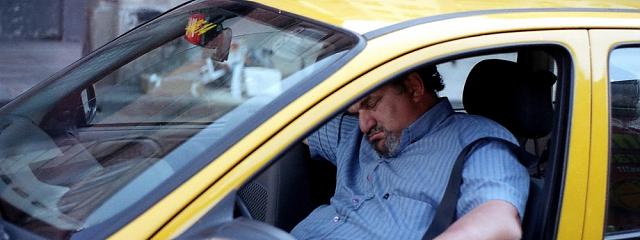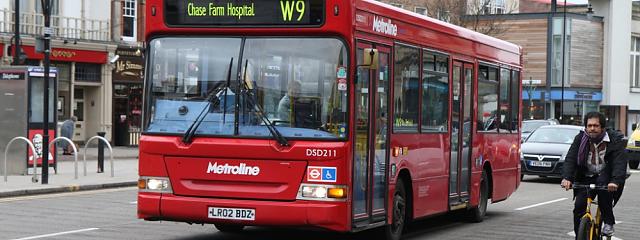
HGV operator loses licence after cyclists' deaths
HGV operator loses licence after cyclists' deaths
Rogue operators licence finally revoked
"By far the worst case I have seen since I started as a Traffic Commissioner in 2007," were the words used yesterday by Traffic Commissioner Sarah Bell as she revoked the HGV operator's licence for Frys Logistics Limited, whose lack of regard to the rules she believed "contributed to the death of Andrew McMenigall and Toby Wallace".
Revoking the licence as from midnight on 23 December, she also disqualified Transport Manager Mark Darren Fry, the sole director of the company, from acting as a Transport Manager for 10 years, and both the company and Mr Fry from holding an operator's licence or being involved in the management of HGVs for the same period, saying this was "the longest period of disqualification she had imposed by far" as a Commissioner.
Land's End to John O'Groats charity cyclists
CTC has reported on the tragic deaths of Andrew McMenigall and Toby Wallace previously within our Road Justice Campaign. They were just 40 miles into a charity ride from Land's End to John O'Groats in July 2013 when they were killed near Newquay as HGV driver Robert Palmer drove into them after falling asleep at the wheel.
Palmer pleaded guilty at Truro Crown Court in September 2014 and was given a prison sentence of eight-and-a-half years for causing their deaths by dangerous driving and a separate offence of dangerous driving seven weeks later when he drove into the rear of another vehicle.
Palmer worked for Frys Logistics Limited, who regularly allowed him to drive while exhausted after working consecutive shifts, repairing vehicles in their yard followed by a shift driving an HGV, ignoring the risks posed by sleepy drivers.
CTC has been campaigning to strengthen the enforcement of lorry operators such as Frys. CTC has made specific submissions (attached below) on HGV regulation to the ongoing Transport Committee Inquiry into road traffic law enforcement, and will be giving evidence on this to that Committee next week.
Reprehensible approach to road safety
Describing their approach as "reprehensible", the Commissioner concluded that the operator had knowingly allowed drivers to breach the driver hour regulations on a regular basis. Following the tragic events in July 2013 the Driver Vehicle Standards Agency (DVSA) identified that the operator's drivers were breaking the rules, yet despite the appalling consequences for Andrew and Toby, the company controlled by Mr Fry displayed no contrition, remorse, or ability to learn from past mistakes.
As described by the Commissioner, they "knowingly continued with the practice of sending out drivers who had not had their rest period", adding that: "Mr Fry has a calculated approach to road safety – it appears that the interests of profit supercede road safety."
Mr Fry has a calculated approach to road safety& – it appears that the interests of profit supercede road safety.
Sarah Bell, Traffic Commissioner for the West of England
Failure to accept responsibility
Toby's parents attended the public inquiry in Bristol yesterday. They were unable to hear an apology from Mr Fry, or any acceptance of responsibility. Neither he nor anyone from the Launceston-based company attended. The Commissioner had refused an application he made the previous week to adjourn the inquiry, citing his failure to comply with any of her previous directions during the DVSA investigation. So nobody was there to answer any difficult questions.
The company filed no evidence and did not make its records available to DVSA during their investigation, leaving the Commissioner to conclude that this was "an operator who should be put out of business".
Nearly 29 months to close a dangerous operator
Yesterday, the DVSA presented detailed evidence to the Commissioner to show that this operator was not fit to hold a licence and operate a HGV business. The Commissioner's decision is effective from 23 December, nearly 29 months after the lives of two families were permanently shattered.
Robert Palmer was called to account for his responsibility relatively quickly. His employer knew they were sending out tired drivers, had been doing so previously, and have continued to do so. They have, however, been able to carry on trading, putting road users at risk whilst the enforcement process has progressed at a snail's pace.
Delays in regulating HGV operators are unfortunately not peculiar to this case. Earlier this year, CTC reported on similar systemic delays prior to the Traffic Commissioner for the South East and London Nick Denton revoking the operator's licences of Alan John Drummond and Colin Drummond. They failed to carry out any checks on their driver Barry Meyer, who was responsible for the death of cyclist Alan Neve by careless driving while driving a tipper truck.
The Commissioner only found out about the Drummond case in April of this year, 21 months after Alan's death. Another operator who continued to trade and operate for over two years before the regulator was effectively able to protect other road users by closing them down.
There is a parallel between these two cases – the Drummonds also failed to attend the public inquiry in July to answer any questions, or perhaps apologise for their failures.
Effective enforcement and regulation
The Traffic Commissioners are toothless tigers in regulatory terms until rogue operators are brought to their attention. They are not investigators. They consider the evidence put before them. DVSA is one of the agencies that can investigate and present that evidence, but needs to be funded and resourced to do so. They also often await the outcome of police enquiries before commencing their own.
In the Frys' case, a police investigation of the operator was only concluded in January 2015. DVSA put any further investigation on hold pending the police enquiries. When the police decided to take no further action the DVSA commenced their investigation, leading to yesterday's public inquiry, but the timescales are too long and compromise road safety, particularly for vulnerable road users.
In London, the creation of the new Freight Enforcement Partnership was announced last month. This is a simple but fantastic concept which CTC supports and would like to see implemented nationally. The idea is partnership and co-operation between all of the enforcement agencies, principally the police and DVSA but also potentially the Health and Safety Executive (HSE), to share information, work collaboratively and, with the Traffic Commissioners, establish a more effective enforcement and regulatory regime.
What has happened with Frys shows why enforcement partnerships nationally need to be considered.
DVSA claim they were asked by the police to put any enforcement on hold pending the police investigation. The police then took a decision to take no further action in January, before the information from the DVSA investigations was available.
The Coroner for Cornwall Dr Emma Carlyon has not yet called for a full inquest into the deaths of Toby and Andrew. CTC will be asking her to reconsider that decision, but we have yet to receive any response to our previous correspondence. Her position may be that she was waiting for the outcome of the Traffic Commissioner's inquiry before making any decision.
The HSE should also have a role in relation to an employer who sends out an exhausted driver to drive in charge of an HGV. CTC still awaits the response of the HSE and the police to our correspondence highlighting other cases where employers in similar circumstances have been convicted of Health and Safety or indeed manslaughter offences.
The suspicion is that too many within the enforcement, regulatory and judicial process await the investigations and decisions of others, the consequences of which are delay, unnecessary distress for families of victims, and with HGVs, ongoing risk from operators whose licences need to be revoked.
'Please try and get the law changed'
This was the message from Toby's parents yesterday, as they thanked CTC for covering this case. Hearing that Mr Fry was prosecuted earlier this year for tachograph offences which pre-dated their son's death, that DVSA identified concerns regarding regulatory compliance back in 2013, and that Frys have failed to comply with the subsequent DVSA investigation since January, they could be forgiven for asking why the wheels of justice and regulation turn so slowly.
Joined-up partnership working in enforcement is one partial solution, but that requires adequate funding of the organisations as well as communication and co-operation. Hopefully, the Transport Committee will listen next week.











Comments
It has been a long trail that
It has been a long trail that Duncan, and Rhia before him, have steadily worked onto get this far, building a number of good links with the Traffic Area Offices in Bristol, and Eastbourne to keep track of the operators who, when the published record of their dealings with the Traffic Commissioners, so often traces a long history of warning signs.
In the case of Fry's, the revoking of Arthur Fry's licence in May 2010, saw the application to start operating as Fry's Logistics from the same address, down a narrow country lane several miles from Launceston. Despite having 'lost his repute' to work as a Transport Manager, Arthur Fry was initially put forward as the named holder of the Certificate of Professional Competence on the application. Whilst most applications are approved within a 4 week cycle, it took 14 months and calling 2 Public Inquiry hearings before the company got its licence in July 2011 posing an interesting question about which company was doing the work over that period.
Such detail highlights the challenging task for DVSA to monitor the thousands of operators across the UK and the Traffic Commissioner to follow up the deluge of reports with appropriate action, and getting the backing to deal with any appealed decisions - when an operator may often continue to operate, pending the appeal hearing. One of the Commissioners noted that he could only consider the delivery of around 300 formal hearings per year, with the resources these demanded, yet he had over 1000 case files to select the most serious cases from, and had to consider other ways by which to clip the wings of fly-by-night operators.
Reading between the lines of the fortnightly Applications and Decisions (A&D) can be a very useful way for local campaigners to get the measure of local operators who appear to be 'misbehaving' and the eyes of the wider public often provide the alert that DVSA can follow up. Bear in mind here that the thousands of applications being processed, through the centralised system often has to rely on the system spotting detail such as Arthur Fry's name being put forward as Transport Manager despite his concurrent disqualification in May 2010, a tough task, and one where the local scrutiny of local applications can enable the public at large to respond - for example setting conditions for noise, on street parking, and other operating limits for a new or expanded operating base.
One interesting detail for Fry's Logistics included an application to move their operating base to a purpose-built depot on an industrial estate in Scarne, barely 1 month after the fatal crash, approved, without any comment or conditions at the beginning of October 2013, and, at the beginning of this year, further applications to open new operating bases. The website http://www.tan.gov.uk/tanen/vosa_anonymousoperatorsearchresults_new.asp provides the database in various forms. A publications search (set dates back to 2010 or earlier) with licence OH1096328 will allow you to read A&D entries in more detail.
This does beg one very important question, which has not been properly answered in this case, and almost every other fatal crash. The HGV, and driver were only being used to deliver their load for a principal client, who ultimately carries the liability, to apply due diligence over their operations and the operations that they sub contract down the supply chain - "To prevent harm" This is commonly referred to as the duty of care when corporate and individual negligence is being discussed.
The reports from July 2013 indicated that Palmer was regularly driving the night trunk delivery contract servicing Lidl stores in Cornwall from a larger depot in Bristol. It is not clear whether this was a directly contracted service, or Fry's was sub-contracted by a larger logistics operator because they were a cheaper option than having 'own staff' and vehicles operating in the far West of the Cornish peninsula. Somewhere in the management of that contract, there has been a serious shortcoming in monitoring and management - due diligence. In some corporate office this should be prompting a few questions about the trucks running around the UK with their corporate branding being operated by their contractor in an appropriate and auditable way.
The Drummond saga (OK1046680) equally can be tracked back through both the specific company, and the previous companies that Colin Drummond was responsible for operating, and their common addresses - again use the website http://www.tan.gov.uk/tanen/vosa_anonymousoperatorsearchresults_new.asp with the appropriate search criteria (which must be precise or with * as wildcard elements of part details). A Drummond haulage operation continues to operate from the same registered address, with new management. Coincidentally the application to change the operating base for the truck that killed Barry Meyer was also made barely 1 month after the fatal crash.
In a sharp contrast with Cornwall, The North of Scotland has for several years now, seen the 150 mile trunk journeys from retail chain depots in the Central Belt, delivered by intermodal containers on rail vehicles, and transferred to road for the last, and relatively short trips to the stores. ONE train potentially cuts over 1000 hours of risk exposure PER WEEK from HGV's being driven to and from the North of Scotland. Time perhaps to address the HGV risks with a wider vision?
One closing post-thought on enforcement and effective recording. Perhaps any fatal or serious crash should be recorded in the fortnightly A&D record, to ensure that the Commissioners have the details to hand, first to consider any call on further investigation, and second to compare with any previous entries on the regulator's records, and any future applications for changes, especially when these are made closely following a fatal, or serious incident.